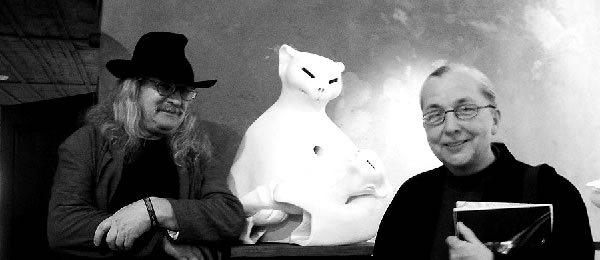Juliana Jirousová was born in September 1943 in Stará Říše. Her father was the painter Otto Stritzko and her mother, Marie Florianová, was also a painter. Juliana’s grandfather, Josef Florian, was an important publisher and translator, who also lived in Stará Říše.
As a result of her so-called “cadre profile”, Juliana Jirousová was not allowed to study at university. Since she did not want to pursue a career in art as her family had done, and could not study, she sold furniture in Prague for a year. However, she soon started painting, influenced by Byzantine enamels. From 1964, she was employed as an art therapist at a psychiatric hospital in Havlíčkův Brod. She worked for a while in the most well-known psychiatric hospital in Czechoslovakia – Bohnice in Prague. However, she returned to Stará Říše due to the links between the medical staff and the secret police (StB). At home she continued to paint.
In 1972 she met Ivan Martin Jirous and began attending events connected with the underground and concerts by the band The Plastic People of the Universe, whose manager was Jirous. Juliana became integrated into the so-called second culture. Four years later, Jirous and Juliana got married and Jirous used his wedding as a pretext to hold the second Festival of the Second culture in Bojanovice. In response to the festival, Jirous was arrested and convicted in the “trial of the Plastic People“. After his release from prison in 1977, Jirous and Jirousová signed Charter 77. Besides writing poems, organizing “second culture” and managing the underground band The Plastic People, Jirous alias “Magor”, was also involved in creating samizdat volumes. His wife helped and supported him in these activities. During their marriage Jirous was imprisoned four times.
While they were separated, the married couple wrote letters to each other. Extracts from these letters were published in samizdat volumes (for example, in the magazine Koruna), and after the Velvet Revolution part of this correspondence was published in 2015 (Ahoj můj miláčku). Despite the prison censorship, these letters shed some interesting light on the life of prisoners. They help literary scholars in their studies of poems by Jirous, and they provide colour to the events of the seventies and eighties. The publishing house Torst owns some of these letters, and some of them were donated by Juliana and her daughter Františka to the Libri Prohibiti library. Juliana still lives in Stará Říše, where she focuses on painting with Christian motifs.

